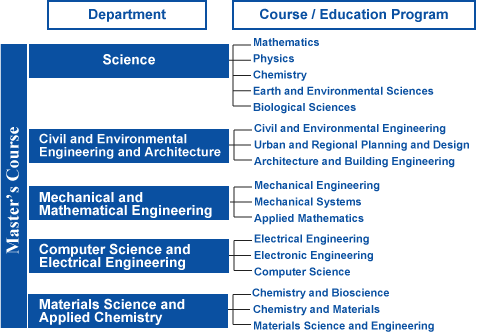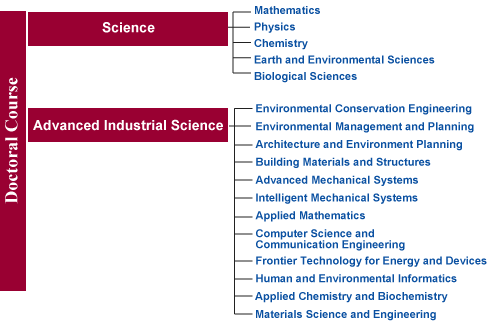About GSST
- HOME
- About GSST
- Overview
Overview
To adapt to our increasingly complex and diverse society, modern science and technology requires the pioneering of new frontiers and interdisciplinary fields free from the limitations of conventional academic systems.
In order to create and advance these new frontiers and interdisciplinary fields, the next generation of science professionals must have not only an advanced expertise in their own specialties but also extensive basic knowledge for understanding other fields.In response to this growing need, the Natural Science Education Department underwent the following reorganization in 2018.
To equip graduates with expertise founded on broad but solid academic abilities in each field of study, in keeping with a six-year program of consistent education from an undergraduate to master’s program, a master’s program linked to undergraduate studies consisting of one science department (the Department of Science) and four engineering departments (the Department of Civil Engineering, the Department of Mechanical and Mathematical Engineering, the Department of Computer Science and Electrical Engineering, and the Department of Materials Science and Applied Chemistry) was established.
A doctorate program has also been established with two departments, a Department of Science aimed at furthering students’ abilities cultivated through undergraduate- and graduate-level studies in the field of science, namely, logical reasoning abilities and observational abilities for discerning the essence of a situation, through the proactive efforts of the students, and a Department of Engineering aimed at strengthening and furthering the advanced knowledge and technology necessary to respond to the needs of society, cultivated through undergraduate- and graduate-level studies in the field of engineering, through the creative efforts of the students.
In order to promote advanced and reliable knowledge in various specialized fields as well as the creation of new frontiers and interdisciplinary fields through mutual understanding with other fields, and to cultivate the ability to address diverse problems by viewing them from a broad perspective, the Advanced Liberal Arts Education course, through which lectures are held by inviting instructors from universities, research institutions, and companies both inside and outside Japan, was established as part of the Global Joint Education Center (GJEC). The Innovation Leader Development Program and the Aim High Program have been established in the GJEC. The Innovation Leader Development Program aims to train future research leaders and entrepreneurs. The Aim High Program consists of two courses: the Researcher Training Course, which endeavors to build collaborations with researchers outside of Japan to train doctoral researchers with a global mindset who will act as leaders in academic research around the world, and the Industrial and Academic Collaborative Course, which endeavors to train doctoral business professionals who will take the lead in innovation in collaboration with universities and companies.
Furthermore, the International Joint Education Program (IJEP), which allows students to obtain a degree through only English courses, has also been established.
Many international students enter this program, and the daily interactions with international students create a foundation to foster a global mindset for the mutual understanding of diverse lifestyles, religions, and the like.
In this way, this department has established a system to put into practice a graduate school education that cultivates solid expertise as well as the ability and inclination to face problems through collaboration with other fields and an international outlook.
Organization



